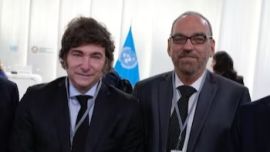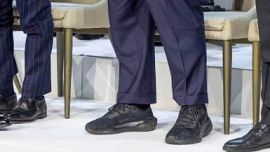Facing a deep currency crisis, Argentine leaders sought help from the International Monetary Fund last year, and Christine Lagarde’s message to them was clear: you’ve got a friend in me.
A little over a year later, Lagarde is departing the IMF after she was nominated to be the European Central Bank chief. That leaves President Mauricio Macri without one of his top international allies, while he prepares for a challenging re-election bid.
Argentina’s record US$56- billion IMF bailout remains intact and the institution is still fully behind Macri. But it remains to be seen if the next managing director will give his government the sympathetic treatment that the former French finance minister usually offered.
PERSONAL TOUCHES
Lagarde’s personal touches on the agreement with Argentina included provisions on social spending and gender equality. She also strove to communicate the deal to the public in a way that would improve the Fund’s battered image as an insensitive austerity hawk in Latin America, according to two people with direct knowledge of the IMF deal. And as Argentina faced volatility, Lagarde was very flexible and supportive of policy changes.
She frequently spoke by telephone with Macri and emphasised during a December meeting with him that he spend on social programmes to help shield Argentines from the pains of austerity. She also shared a WhatsApp chat with Economy Minister Nicolas Dujovne, according to the people, who asked not to be named because they aren’t authorised to speak publicly.
“It’s clear that Lagarde staked her reputation on this bailout,” said Benjamin Gedan, director of the Argentina Project at the Wilson Center. “This was the largest loan in IMF h istor y and represents a mammoth liability for the fund, so any managing director would invest personal capital in showing Argentina whatever flexibility it needs to come out the other side.”
Lagarde’s trusting relationship with Macri and Dujovne made negotiating and overseeing the deal easier than otherwise, according to one Argentine government official. However, her departure doesn’t change anything for the pact because the core support came from the IMF members financing the deal. Plus, Dujovne already knows IMF interim chief David Lipton very well, according to the official, who also asked not to be named.
The historic package was backed by the US government, the IMF’s largest financier, as well as Japan, Europe and Canada. Gedan says Washington’s stance toward Argentina ultimately dictates the deal’s future.
NO FIASCO
Still, Lagarde intentionally went out of her way to publicly support Macri, one of the people said. After Argentina faced concerns about its ability to host the G20 Summit last year, Lagarde lauded Argentine leaders. The meeting ended with each country signing the traditional communiqué in Buenos Aires, and China-US trade tensions briefly seemed to ease.
“Everybody expected it to be a fiasco because of all sorts of reasons, and thanks to the Argentines’ genius,” Lagarde said on Instagram in December, “this was by far and away, the best” G20 summit.
In any case, it wasn’t smooth sailing for Lagarde in Argentina. The deal had to be renegotiated and expanded, while inflation remains high, unemployment reached the double digits and the economy hasn’t officially come out of recession.
Those setbacks raise the possibility that the next IMF leader changes t u ne tow a r d S o ut h America’s second-largest economy. A major issue on the hor i zon is whether a new government will try to modify the terms of the agreement, something opposition front-runner Alberto Fernández has already suggested. The country goes to the polls on October 27.
“With the opposition, the IMF would face negotiators with fundamental disagreements about the structure of the bailout,“ Gedan said.
related news
by BY PATRICK GILLESPIE - BLOOMBERG




















Comments